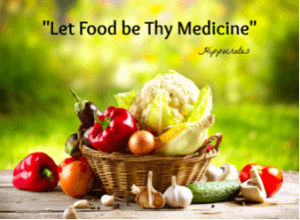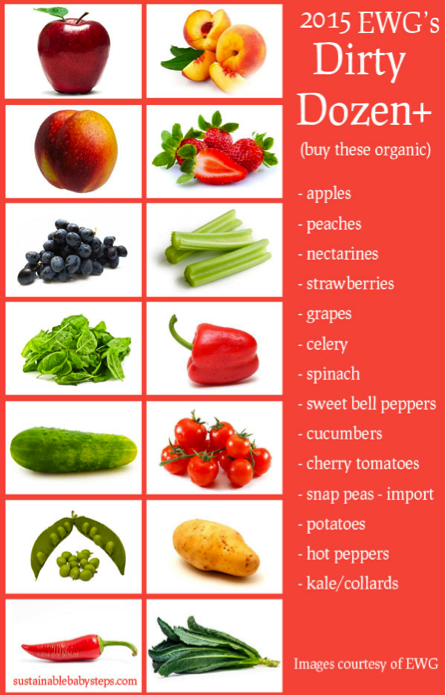 “Do I really need to be eating organic?” This is a frequent question in my office. My answer is YES, if you want to decrease your exposure to pesticides. However, there is wiggle room and you don’t have to buy everything organic…and at times it may not be the best choice!
“Do I really need to be eating organic?” This is a frequent question in my office. My answer is YES, if you want to decrease your exposure to pesticides. However, there is wiggle room and you don’t have to buy everything organic…and at times it may not be the best choice!
First let’s first clarify what “organic” actually means when it comes to our fruits and veggies. This way you can make informed choices for you and your family.
According the US Department of Agriculture: “Organic is a labeling term that indicates that the food or other agricultural product has been produced through approved methods that integrate cultural, biological, and mechanical practices that foster cycling of resources, promote ecological balance, and conserve biodiversity.” So simply put, organic food is any food that has been grown using accepted organic practices.
Accepted Organic Practices Include:
- No chemical pesticides: Exposure to large amounts of pesticides have been linked to possible cancers, diseases and disorders in adults and children. They also create superbugs that are resistant to pest control and create problems for farmers and gardeners alike.
- No chemical herbicides: Keeping weeds at bay is important, but petroleum-based herbicides disrupt plant hormones, impact the natural balance of habitats and has an effect on our health.
- No chemical fertilizers: Fertile soil is necessary for plant growth, but chemical fertilizers can contaminate the groundwater and may contribute disease.
- No genetically-modified organisms: GMOs are still highly untested, although we know they can contaminate organic fields quickly and easily with their seed. (GMOs will be a topic for a blog soon since lots of questions about this too!)
- No artificial additives: This includes artificial colors, preservatives, flavors, taste enhancers, ect. which have been shown to have an adverse affect on our health.
- No irradiation, sewer sludge, and nothing else that goes against common sense or nature.
A farmer must pass these stringent guidelines to put “organic” on their label. They may however specify if certain ingredients are organic, or if the grower or producer follows organic practices without certification. They will often highlight the practices they follow, such as “grown with pesticides”.
Organic food is grown with organic pesticide and herbicide methods, using only natural fertilizers, organic or heirloom (traditional) seeds, no or all-natural preservatives. USDA Organic or Quality Assurance International (QAI) is how we identify organic produce in our markets.
Just be aware: becoming an organic certified farm can be very involved and expensive for the farmer, and it could take years to convert a conventional farm to one that meets standards for certified organic. Check with your local farmer about their practice. You will find that several farmers here in FL do NOT use pesticides and use very safe practices despite not being a Certified Organic Farm. So ASK – since local is almost always the BEST option for optimal quality, taste, and nutrient value…and to reduce your carbon footprint!

Every year the Environmental Working Group (EWG) launches their list of the Dirty Dozen and the Clean 15 for produce. These two lists are helpful in assisting you in finding which fruits and veggies you should prioritize into your organic food budget and which are safer to buy conventionally (such as when organic isn’t affordable, or even available in your region). I provide the pocket guide from EWG in my office of the Dirty Dozen and Clean 15; but you can click on EWG link above and download your own list.
Better YET…download the app on your phone…just type in Dirty Dozen…and Whaaalaa!. I love this app as a reminder when shopping, since your phone is usually right at your fingertips!
Now it’s important to keep some things in mind…
First, just because it’s on the Dirty Dozen list does NOT necessarily mean you shouldn’t ever eat it.
Although organic is always preferred (both for your health and health of the environment) eating conventional produce is better than eating less or none at all. And properly washing your produce will also go a long way in decreasing your exposure to harmful chemicals.
Second, just because it’s on a Clean list doesn’t necessarily make it the best option.
You’ll notice that many of the cleanest fruits are tropical, which means they may not be local to you at all. (If it is coming from overseas, that means it has lost much of its nutritional value sitting in a box and store shelf likely for weeks/months in transit vs. the gorgeous FL mango or grapefruit picked a couple weeks ago!)
**Use this as a guide to help you make informed decisions, but not as the only resource. The goal is to eat 4-6 cups of fruit/veggies per day. Try to most often purchase the Dirty Dozen organic (especially if you or your children eat large amounts!) GO LOCAL as often as you can (but we will have to wait for more options until Fall here in FL!) Remember though, eating conventional fruits/veggies far outweighs the concerns compared to eating less or none at all!
Until next time…. Keep striving to “nourish well”
Cheers,
Julie



